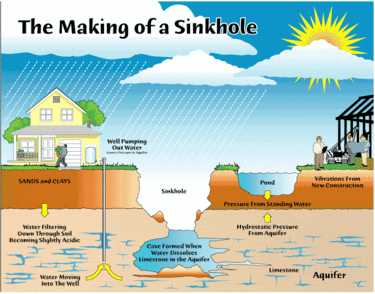 Florida’s weather and lack of a state income tax make it one of the most ideal places for people to live in. However, there is one thing that happens in Florida that many are unaware of – sinkholes.
Florida’s weather and lack of a state income tax make it one of the most ideal places for people to live in. However, there is one thing that happens in Florida that many are unaware of – sinkholes.
Even though most Floridians are unaware of them, Florida has the highest occurrence of sinkholes in the country.
Sinkholes develop when water moves through the underground layer of limestone. This layer is right below the surface. As the water continues to move through the small holes found in limestone, the holes enlarge and the rock eventually dissolves. In extreme cases, a sinkhole can grow 40 to 60 feet deep and wide.
Part of the reason for the surge in sinkhole claims is due in large part to the recent explosion in real estate development throughout Florida, and especially in South Florida. Over development has left the ground susceptible to sinkholes. Plus, while sinkholes occur in other U.S. states, Florida is more prone to sinkhole related problems because of underground limestone that dissolves under certain conditions, especially in areas that have been over developed, according to many leading geologists.
If you suspect your property is sitting on top of a sinkhole, its your responsibility to immediately notify your insurer. Florida law requires insurance companies to cover damage caused by a sinkhole.
As we’ve previously discussed, Florida lawmakers passed a new law this past session that required insurers to provide coverage. However, there is a two-year claims deadline (down from five).
So, how would you know if you’re property is sitting on a sinkhole? Here are some clues: your neighbors have a sinkhole; cracking in your walls, floor, or pavement; doors or windows no longer closing properly; small hole in your yard; and, small pond formation where water has not collected before.
Given our extensive experience litigating for, and against, insurance companies, our insurance litigation practice group is prepared to provide aggressive, efficient and effective representation on a broad spectrum of insurance claims in Florida for local, national, and international clients. We are prepared to advocate insurance claims at the pre-suit stage, trial, appellate and arbitration levels.
If you are facing a dispute over an insurance claim in Florida, contact Alvarez & Barbara, LLP, for a free and confidential consultation to discuss your rights.
—–
EXTENDED BODY:
Consider Your Options. Contact Us Today.
Before opening our law firm in 2006, our attorneys worked for some of the state’s, and nation’s, largest law firms, and worked representing the insurance companies for years. Our attorneys are now uniquely positioned to use that experience to assist individuals and businesses alike throughout Florida with their insurance claims. As a result, our attorneys are well versed in the impact insurance has on businesses, condominiums, and individuals alike. Our insurance litigation practice group is prepared to tackle your insurance claim.
Given our extensive experience litigating for, and against, insurance companies, our insurance litigation practice group is prepared to provide aggressive, efficient and effective representation on a broad spectrum of insurance claims in Florida for local, national, and international clients. We are prepared to advocate insurance claims at the pre-suit stage, trial, appellate and arbitration levels.
If you are facing a dispute over an insurance claim in Florida, contact Alvarez & Barbara, LLP, for a free and confidential consultation to discuss your rights.
Call us today toll free at 1-866-518-2913 or at 305-263-7700.
About the Author – Gabriel de las Salas is an attorney with the law firm of Alvarez & Barbara, LLP. His practice is focused on general civil and commercial litigation, including personal injury, insurance claims and real estate disputes. Mr. de las Salas received his B.A., cum laude, from the University of Florida, and his J.D., from Stetson University College of Law.